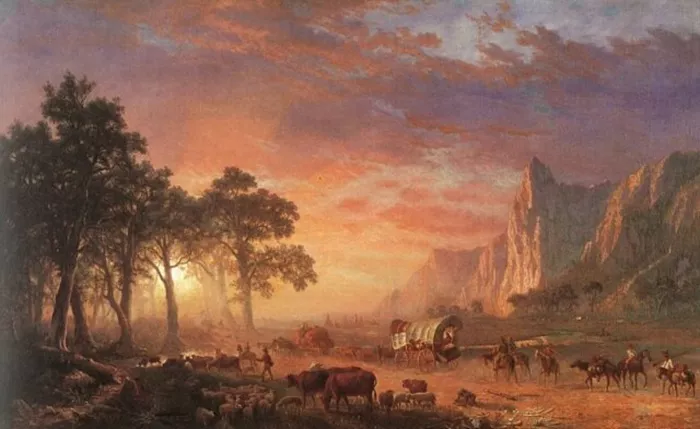Welcome to Poem of the Day – Pioneers! O Pioneers! by Walt Whitman.
Walt Whitman’s poem Pioneers! O Pioneers! is a powerful call to action and a celebration of the American spirit. Written in 1865, during a period of significant change in the United States, this poem explores themes of adventure, progress, and the pioneering spirit. It urges the reader to recognize the importance of exploration and the courage needed to push forward into the unknown. This article will break down Whitman’s Pioneers! O Pioneers! to better understand its meaning, structure, and significance.
Pioneers! O Pioneers! Explanation
Background of the Poem
Pioneers! O Pioneers! was written towards the end of the American Civil War, a time when the country was grappling with division and change. Whitman was deeply affected by the war, and many of his poems reflect the struggles and the hopes for a united future. The poem speaks to the spirit of pioneering—symbolic not only of the physical movement westward but also of the emotional and ideological challenges of the time.
Theme of Exploration and Adventure
At the core of Pioneers! O Pioneers! is the idea of exploration. The word “pioneer” calls forth images of those who push boundaries, explore new lands, and face the challenges of uncharted territory. Whitman addresses these pioneers directly, calling them to rise and continue their mission. The poem’s opening line, “Pioneers! O pioneers!”, acts as a powerful summons, urging the reader to join this brave new endeavor.
The pioneers in Whitman’s poem are not just those who physically moved westward; they represent a broader vision of progress and expansion. They are a symbol of a generation that must not be afraid of challenges, whether they are literal or metaphorical.
The Call to Action
Whitman’s tone in the poem is one of urgency. He uses an imperative style of writing, commanding the pioneers to “march” and “advance.” This sense of urgency reflects the historical context of the Civil War and the period of reconstruction that followed. Whitman saw the country at a crossroads, where it was essential for Americans to embrace the challenges ahead to secure a better future.
The lines “Forward! all and always forward! / Take your place on the great platforms of the world” show a direct invitation to action. The pioneers are urged to take their places in history and continue the work of those who came before them.
The Role of the Leader and the People
Whitman often used the voice of the collective in his work, and Pioneers! O Pioneers! is no different. He calls not only to the individual but also to the group as a whole. The pioneers in this poem are not alone; they are part of a greater cause. This reflects Whitman’s belief in democracy and collective action.
There is also a sense of egalitarianism in the poem. Whitman refers to the pioneers as a diverse group, including those who may not be considered leaders in a traditional sense. He writes, “For we are the pioneers! / We are the leaders!” This suggests that the American frontier was not just the work of a few, but a collective effort that required everyone to contribute, no matter their background or status.
The Role of the Poet in the Poem
As in many of his works, Whitman positions himself as a guide to the people. He is not only observing history but is a part of it. He refers to the poet as one who leads and inspires, much like the pioneers. In doing so, Whitman elevates the poet to a position of authority, where their words have the power to shape and guide the direction of society.
Whitman writes, “And the land we are seeking, / Through the wide open spaces of the world, / For we are the pioneers, / We are the leaders!” Here, the poet’s voice functions as a map or a compass, guiding the pioneers through their journey.
Symbolism in the Poem
The pioneers, marching forward into the unknown, represent the spirit of progress and change. Whitman uses this image to symbolize the ongoing evolution of America. As the nation moved westward, it was also moving toward greater social, political, and cultural transformations.
The land itself in Pioneers! O Pioneers! acts as both a literal and metaphorical space of opportunity. For Whitman, the land represents not only a physical frontier but also a place where new ideas and values can be tested. It is a space of freedom, where individuals can shape their own destiny and contribute to the greater good.
Structure and Style
The poem is composed in free verse, a style that Whitman popularized. The lack of a fixed rhyme scheme or meter reflects the expansive, unconfined spirit of the pioneers themselves. The free-flowing nature of the poem mirrors the open landscape the pioneers traverse, allowing for flexibility and freedom in the poem’s rhythm and form.
The repetition of the phrase “Pioneers! O pioneers!” serves as both a call to action and a reminder of the collective spirit required to succeed. The poem is filled with exclamatory phrases that reinforce the energy and urgency of the pioneers’ mission. This is a poem meant to inspire and motivate, filled with the language of triumph and perseverance.
Conclusion
Walt Whitman’s Pioneers! O Pioneers! is a poem of hope, action, and perseverance. It captures the spirit of a nation on the brink of transformation and calls upon its citizens to rise and embrace their role in the future. The poem is a tribute to the pioneering spirit, not just in the context of geographical expansion but in the larger sense of progress, change, and the pursuit of greater ideals.
Through his passionate tone and call to action, Whitman encourages us to remember the importance of forward motion and collective effort in shaping the future. The poem remains a timeless reminder of the power of perseverance, community, and vision in overcoming challenges and embracing opportunities.

